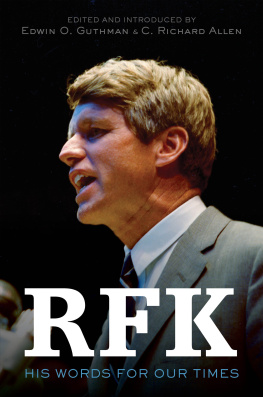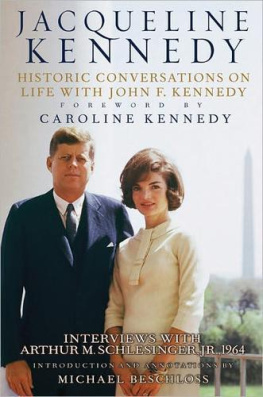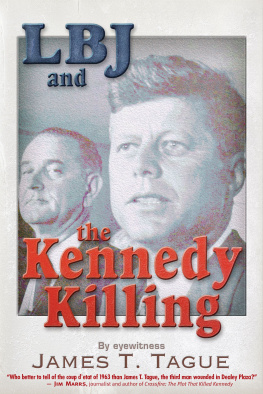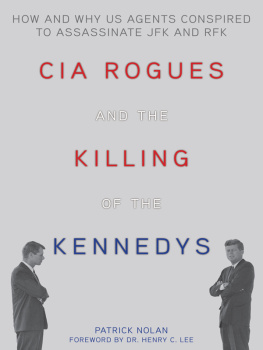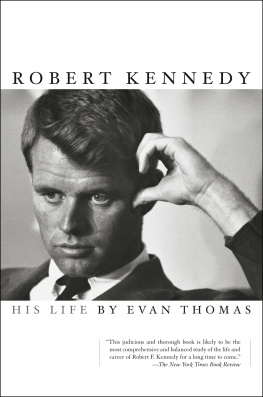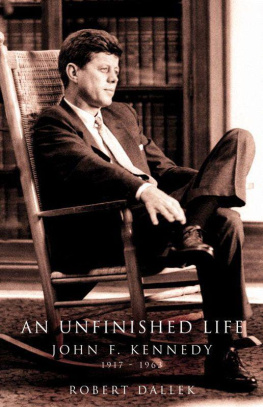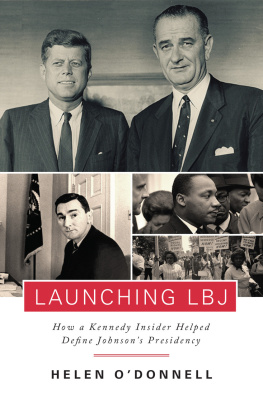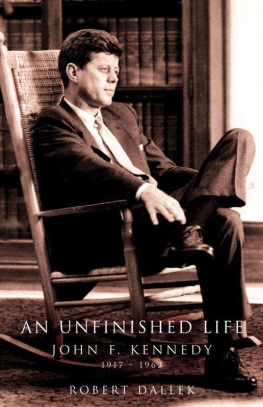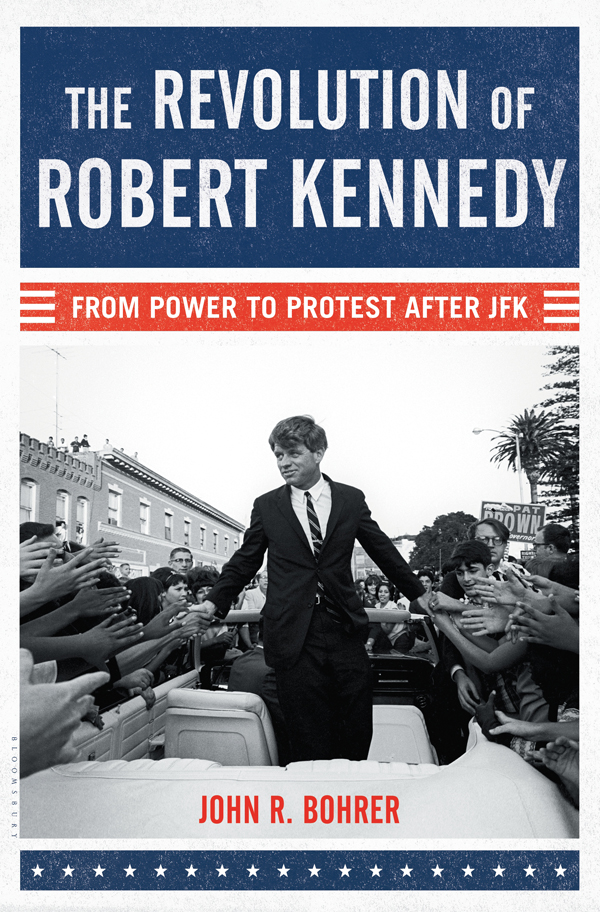Contents
Guide
Pagebreaks of the print version
EVOLUTION OFOBERTENNEDY
For all my JBs

C ONTENTS
December 18, 1963
I n his darkest moment, Robert Kennedy defined change.
We are a young country, he wrote on December 18, 1963, four weeks after his brother, the President, was assassinated. We are growing and expanding until it appears that this planet will no longer contain us. We have problems now that people fifty, even ten years ago, would not have dreamed would have to be faced.
Bobby was writing the foreword to a memorial edition of John F. Kennedys book Profiles in Courage something he would not have dreamed of facing four weeks earlier. In an instant, he had lost his brother, his boss, and his security. The mingling loyalties to family and country had made life before simple, he would say. Now it was racked by uncertainty. The presidency belonged to Lyndon Baines Johnson, a man whose morals and judgment he questioned, and whose insatiable appetite for political domination convinced Bobby that the name Kennedy would mean little in a few short months. The attorney general warned friends to act fast and get what they wanted, for their political power would soon expire.
Bobby himself was unsure of what he wanted. With each passing day, pressure mounted for him to decide how to use what he had inherited. So many had put their faith in a future with JFK at the helm. People now looked to Bobby for actionsome for direction, most just for comfort in their grief.
This reaction would have seemed strange just a few weeks earlier. Many liberals did not trust the Presidents younger brother and chief political strategist. They thought he put elections before principles and were disgusted by his battering style on behalf of Communist-hunting and crime-fighting Senate committees in the 1950s. Robert was perceived as a tough guy, insensitive, cruel, vindictive, clannish, summed up in a word which he never shook off ruthless, the Yale law professor Less than forty-eight hours later, the President was dead.
That mood was nothing compared to the lows Bobby would experience after JFKs assassination. But the tragedy also elevated him in ways he wouldnt have expected. In time, ruthless Robert Kennedy would become the redoubt of a young decades ideals. There were people who wanted to hope, to recapture the excitement, and believe that the New Frontier President Kennedy spoke of was not behind them.
This idea was slow to dawn on Bobby as the cold crept in, the days became shorter, and the sleepless nights stretched on. He would later say that he thought about the future in that month to the point where the only decision he could make was to stop thinking about it. Yet in those lost days, he wrote the truest expression of who he was and what he lived for.
On December 18, the day they renamed New Yorks Idlewild Sandburg, the poet and biographer of Lincoln, was ancientnearly eighty-six years old. Bobby had just turned thirty-eight. It was up to him.
And so the attorney general sat alone in his Justice Department officethis enormous mausoleum, as a reporter once described itof the first sheet of ruled paper. Hardly any revisions were necessary.
He wrote how President Kennedy had suffered greatly in his forty-six years. A bad stomach. A bad back. Long spells in hospitals. At least half of the days that he spent on this earth were days of intense physical pain. Bobby remembered their 1951 trip around the world, to Okinawa, where Jacks fever reached 106 degrees. They didnt think he would live, he wrote. But during all this time, I never heard him complain. I never heard him say anything which would indicate that he felt God had dealt with him unjustly.
Kennedys didnt cry. They did not wear their pain for all to see. They were not halted midsentence by emotion or have eyes welled with tears. They were not given a sleeping pill and heard through the door, crying, Why God?
In the four weeks between his brothers death and writing the foreword, Robert Kennedy had done all these things, no matter how much he willed himself not to. He didnt just feel painhe emitted it. Desolation, scribbled Edwin Lahey, the smoky old newsman who was granted the first interview days before Bobbys writing. Lahey had watched him since he first arrived in Washington as one of Senator Joe McCarthys tenacious boy prosecutors, determined to root out Communism and win absolute victory in the clean-cut 1950s. A dozen years on, the youthful face was creased with experience and crushed by despair. To see Robert Kennedy was to feel his pain.
This was not how Jack Kennedy would be seen, as Bobby wrote in the foreword: Those who knew him well would know he was suffering only because his face was a little whiter, the lines around his eyes were a little deeper, his words a little sharper. Those who did not know him well detected nothing. He didnt complain about his problem so why should I complain about minethat is how one always felt.
Kennedys didnt cry. This was the family mantra and hard-hearted edict of their father, ruthless entrepreneur and ambassador to the Court of St. James, Joseph P. Kennedy, who pounded into his children this unmatched toughness and stubborn refusal of defeat. But few understood the deeper meaning: that Kennedys didnt cry so that others might not cry, too. As their mother, Rose, would write, What he really meant was that there was to be no self-pity , and no burdening of others with any personal misfortunes by making a commotion about them. He knew that for almost everyone life is likely to hold many knocks and bruises, and that people had better get used to that idea at an early age.
Robert Kennedys entire life had led to a bruise he could not forget, a pain that fell drop by drop upon the heart, in the words of a Greek poem he would months later discover. Bobby had to cope with change. Sudden, unwanted, stunning change. It was a time to be brave, a time to have courage. In his memorial foreword, he quoted a passage from his brothers inaugural, beginning with the part just before the eternal Let the word go forth the torch has been passed to a new generation
We dare not forget today that we are the heirs of that first revolution.
In the years that followed, Robert Kennedy underwent his own revolution, recasting him in his time and beyond into a glimpse of a leader still longed for. He had been as rough as JFK had been smooth, and his transition was at many times rocky. He searched for power in traditional means and, when he found himself incapable, used his dissenting voice to exert what influence he could. His actions and gestures, from someone who had been so clearly wounded by the world, brought hope to those who needed healing, even across political divides. These years tell the story of how he dreamed and plotted, where he failed and succeededbut ultimately, how he handled change and tried to send it forth. By 1966, he would find his revolution was catching and watch it sweep across his life and cross currents with a generation, to the extent that a person who had walked the secret corridors of power would at last claim membership among the worlds youth. This world demands the qualities of youth, he would say, not a time of life but a state of mind. For Robert Kennedy understood that a true revolution takes a leader young enough to change with the times.
T hough not a politician in the traditional sense, Bobby was the most political of the Kennedys in November 1963. Unlike his two brothers, he had never run for officea difference that freed him from the burden of having to be liked by all. He became the Kennedy most closely identified with the cold, calculating compromises beneath every successful campaign.


